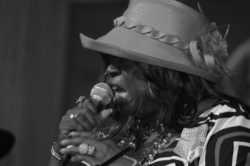Carol Fran
Singer and pianist Carol Fran was a blues, swamp pop, R&B, and jazz musician whose work reflects the influence of southwest Louisiana's culture.

Courtesy of Flickr
Carol Fran. Hammer, Elliott (Photographer)
Singer and pianist Carol Fran was a musician of diverse genres whose work reflected the influence of southwest Louisiana’s regional culture and beyond. Born on October 23, 1933, (née Carol Martin) and raised in the music-rich environs of Lafayette, Fran grew up immersed in blues, traditional jazz, the nascent rhythm and blues (R&B) genre typified by such popular “jump-blues” artists as Louis Jordan, and the accordion-accompanied interpretations of R&B and blues, sung in Creole French, that would come to be known as zydeco in the 1950s. Until her death on September 1, 2021, Fran continued to sing in English and in French.
In the late 1940s she hit the road with the Don Conway Orchestra, followed by a stint singing with the jump-blues band of saxophonist Joe Lutcher. Several years later she married saxophonist Joe Francois. During that era of cultural assimilation, ethnic identity was often considered a career impediment, and she began using a shortened form of her husband’s surname for professional purposes.
The mid-1950s found Fran performing lengthy engagements in Juarez, Mexico, as well as working the south Louisiana “crawfish circuit” at such clubs as the Sugar Bowl in Thibodaux, the White Eagle in Port Allen, and the renowned Dew Drop Inn in New Orleans. At these venues and others, she collaborated and was co-billed with such prominent R&B artists as Gatemouth Brown, Ernie K-Doe, Earl King, and Eddie Jones (a.k.a. Guitar Slim). When Jones died in 1959, Fran led his band for a time.
Early “Swamp Pop” Performer
The 1950s also found Fran embarking on her recording career. Her poignant original composition “Emmit Lee” brought her considerable recognition along the Gulf Coast in 1957. A dozen or so years later, this song was hailed as one prominent example of the retroactively named “swamp pop” genre, alongside such other south Louisiana classics as Phil Phillips’s “Sea of Love.” Fran’s accompanists on “Emmit Lee” included Guitar Gable (Gabriel Perrodin) on guitar and drummer Clarence “Jockey” Etienne, both of whom played on many sessions at J. D. Miller’s studio in Crowley. Miller licensed many of his recordings, including “Emmitt Lee” and Slim Harpo‘s unlikely national hit “Baby, Scratch My Back,” for release by the Nashville-based Excello label. This business arrangement created the mistaken impression that the fabled “Excello sound” emanated from Tennessee rather than from southern Louisiana.
Although “Emmitt Lee” bolstered Fran’s professional credibility, she made little money from it. Sadly, similar circumstances prevailed with her other first-rate recordings, including a rendition of “Crying in the Chapel,” released in 1964. Numerous versions of this song had appeared since 1953; Fran’s exquisite performance showed considerable hit potential but was eclipsed when RCA released a version by Elvis Presley in early 1965. Despite Fran’s lack of record sales, she did earn consistent praise from discerning observers. Author and music researcher John Broven summed up this commercial-artistic dichotomy: “Tragically, her enormous talent has never been widely recognized.”
In 1983 Fran married Clarence Hollimon, whose inspired guitar work highlighted many 1960s blues records by singer Bobby Bland. In addition to Bland, Hollimon accompanied other artists signed to Duke Records, a Houston, Texas-based label that was one of America’s most successful black-owned record companies. Fran and Hollimon toured together, frequently performing overseas, and cut three duo albums for the New Orleans-based Black Top Records: Soul Sensation (1992), See There! (1994), and It’s About Time (2000). After Hollimon’s death Fran moved from Houston back to Lafayette.
In 2006 Fran was the focus of the documentary Le Bleu Bleus, filmed for worldwide French-language broadcast by TV5 Québec Canada. In 2008 USA Today lauded her performance at the New Orleans Jazz & Heritage Festival as “potent and poignant.” In 2010 Fran was prominently featured, as both a performer and an interviewee, in the nationally broadcast radio documentary Still Singin’ the Blues. And on September 25, 2013, Fran went to the Library of Congress in Washington, D.C., to receive a prestigious National Heritage Fellowship bestowed by the National Endowment for the Arts’ Folk Arts Program. Two nights later she closed out the National Heritage Awards concert and brought down the house. She continued to perform around the United States and Europe, as well as in Mexico and Brazil.
